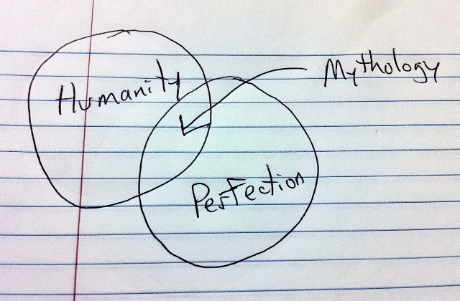Over the past couple of years, I’ve come to appreciate flaws and imperfections in a way that I never did before, especially in people. I confused someone a couple of nights ago by saying that, so it’s forced me to figure out how to explain this counterintuitive notion.
For years, I’ve had the intellectual belief that life is a series of tradeoffs. If you get something positive in one area, you give up something in another part of life. Ralph Waldo Emerson’s essay on “Compensation” influenced me a lot about this subject about 15 years ago. He argued that there’s a natural process that balances everything. I don’t buy everything about Emerson’s philosophy, but I’ve found a lot of truth in this particular idea.
It seems to me that people with great talents and gifts will always have compensating weaknesses, although the positive things sometimes make it hard to notice the negatives. Those who have terrible flaws will almost always have compensating strengths or advantages, even if they’re sometimes hidden by the obvious flaws.
So I recognized — in theory — that great strengths are always going to come with great flaws as compensation. What I didn’t realize until fairly recently was that I had a different standard for certain others close to me. (And for myself.) With certain people, I was expecting incredible strengths and impressive attributes to come with no downsides. So when I found someone amazingly impressive, I put that person onto a pedestal — a place where no one can stay for long.
Someone placed on a pedestal is going to disappoint you. If you put me on a pedestal — heaven forbid — I am going to disappoint you. I’m flawed. I can be a contradictory mess at times. I think too much. I feel too much. I’m not what normal people think is normal. So if you put me on a pedestal, those flaws would soon come out and you’d be terribly disappointed in me.
I placed someone onto a pedestal because she was everything I ever imagined a woman could be. She’s brilliant, beautiful, witty — as well as endlessly fascinating and incredibly deep and she even shares my values to an amazing degree. But people with those strengths and no corresponding weaknesses exist only in the mythological gods dreamed up by the people such as the Greeks or Romans. They’re not real.
This woman turned out to have flaws. Imagine that. She’s very real. She was more ideal than any woman I’ve ever known, but she turned out to have great flaws, too. I could accept her gifts, but I wasn’t able to accept her flaws at the time.
I’ve come to understand how to integrate people’s gifts and flaws in the last few years. I’ve come to accept — in myself and in others — that if there are real highs, there are also going to be deep lows. I’ve learned that only Greek gods live on pedestals — and they don’t exist.
Coming back to where I started, I told someone a couple of nights ago that I had come to “appreciate” her flaws. She didn’t really believe me, and I don’t blame her. I struggled to explain why. It wasn’t just that her flaws were now acceptable. I actually appreciate them. Why?
I finally figured out how to word it. When I see those certain flaws in her or remember others of them, all it does now is provide proof of the corresponding strengths. Sometimes when there’s a tornado, the best strategy to protect yourself isn’t to run. Sometimes it’s to hold on tightly and wait for the winds to calm. It might not be in the National Weather Service’s manual about how to react to tornadoes, but some things are worth holding onto.
Sometimes the scary negatives can serve to prove just how very much someone is worth. I don’t know if it makes sense to you, but I finally get it.

 Some rewards are great enough to ignore risks and take big chances
Some rewards are great enough to ignore risks and take big chances Some of us don’t seem ‘wired up’ to stay sane working for others
Some of us don’t seem ‘wired up’ to stay sane working for others